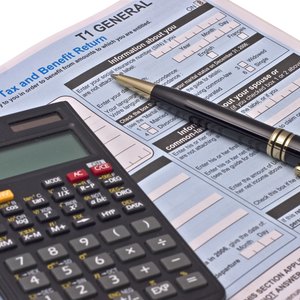
The Canada Revenue Agency allows sole proprietors to claim what the agency terms "reasonable" business expenses as tax deductions. Thus, costs incurred in the typical day-to-day operation of a sole proprietorship are generally tax deductible, as are certain one-time and periodic expenses. Sole proprietors use the Canadian tax form T2125, officially called the Statement of Business or Professional Activities, to claim business expenses when filing personal income tax returns. The sole proprietorship business structure offers the owner the opportunity to deduct any losses from personal income when filing taxes, thereby reducing the overall tax burden if the business is not doing well.
Startups
When you first start a business in Canada, any costs directly related to getting the enterprise up and running are tax deductible. This includes initial costs such as buying needed materials, setting up office space and getting business licenses. Some of these expenses are ongoing and can be deducted in subsequent years.
Ordinary Expenses
Necessary ongoing expenditures such as rent, utilities, telephone service and office expenses are common tax deductions for sole proprietors. Shipping costs, including packaging material and postage, are also customary business expenses.
Cost of Employees
Claim any salaries or wages paid to employees as business expenses. In addition, any benefits you provide, such as paid time off and insurance premiums, should be claimed on your T2125.
Promotion
Advertising expenses for your business are tax-deductible if you pay the money to a Canadian business. You cannot claim money paid to foreign advertising outlets as a business expense.
Fees, Taxes, Interest and Insurance
Property taxes, business taxes and any fees you pay that are directly related to your business are tax deductible. This includes business licenses and any fees you pay for legal or other professional services. You can also deduct the cost of business insurance and interest on business loans.
Shipping, Supplies and Equipment
Supplies, equipment, repairs and maintenance costs on machines or equipment are tax deductible annually for the year in which you paid the expenses. For some types of equipment, you can claim the capital cost allowance, or CCA, the yearly depreciation deduction for durable assets.
Common Limited Deductions
Travel for business purposes is deductible. Meals and entertainment are deductible within limits. Costs of business use of a motor vehicle and business use of your home are deductible in part. For example, if you use a home office, figure the square footage of the space as the fraction of total square footage of the home. Deduct this percentage of household costs, such as utility bills, property taxes, insurance and mortgage interest. Expenses relating to vehicles used both for personal and business purposes must be separated to claim only the business portion on your tax return.
References
- Internal Revenue Service. "Tax Reform: What’s New for Your Business," Pages 3–4. Accessed Oct. 19, 2019.
- Internal Revenue Service. "Tax Reform Provisions that Affect Individuals." Accessed Oct. 19, 2019.
- Internal Revenue Service. "Tax Cuts and Jobs Act, Provision 11011 Section 199A - Qualified Business Income Deduction FAQs." Accessed Oct. 9, 2019.
- United States Congress. "H.R.1 - An Act to provide for reconciliation pursuant to titles II and V of the concurrent resolution on the budget for fiscal year 2018." Accessed Oct. 9, 2019.
- Social Security Administration. "If You Are Self-Employed," Page 1. Accessed Oct. 9, 2019.
- Internal Revenue Service. "Topic No. 554 Self-Employment Tax." Accessed Oct. 9, 2019.
- Internal Revenue Service. "Publication 587 (2018), Business Use of Your Home." Accessed Oct. 9, 2019.
- Internal Revenue Service. "About Form 8829, Expenses for Business Use of Your Home." Accessed Oct. 9, 2019.
- Internal Revenue Service. "Publication 535 (2019), Business Expenses." Accessed March 16, 2020.
- Internal Revenue Service. "Travel, Gift, and Car Expenses," Page 5. Accessed Oct. 9, 2019.
- Internal Revenue Service. "Tax Guide for Small Business," Page 40. Accessed Oct. 9, 2019.
- Internal Revenue Service. "Retirement Plans for Small Business (SEP, SIMPLE, and Qualified Plans)," Page 2. Accessed Oct. 9, 2019.
- Internal Revenue Service. "Retirement Plans for Small Business (SEP, SIMPLE, and Qualified Plans)," Page 18. Accessed Oct. 9, 2019.
Writer Bio
Vicki A Benge began writing professionally in 1984 as a newspaper reporter. A small-business owner since 1999, Benge has worked as a licensed insurance agent and has more than 20 years experience in income tax preparation for businesses and individuals. Her business and finance articles can be found on the websites of "The Arizona Republic," "Houston Chronicle," The Motley Fool, "San Francisco Chronicle," and Zacks, among others.

